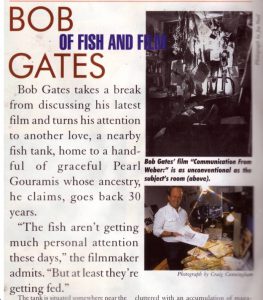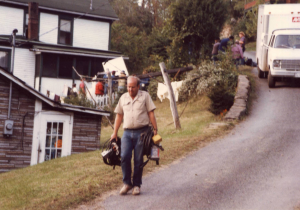From the Archive:
Bob Gates: Of Fish and Film
This is one of several profiles of West Virginia filmmakers I wrote for a 1998 issue of Maryland-based Potomac magazine. Gates was a favorite, a popular character in my hometown. He died in February 2013.
Bob Gates takes a break from discussing his latest film and turns his attention to another love – a nearby fish tank, home to a handful of graceful Pearl Gouramis whose ancestry, he claims, goes back 30 years.
“The fish aren’t getting much personal attention these days,” the filmmaker admits. “But at least they’re getting fed.”
The tank is situated somewhere near the center of Gates’ downtown Charleston studio, several rooms and hallways packed with editing machines, cameras, stage lights, tripods and enough photo-developing chemicals to stock a mad scientist’s laboratory. The wooden roll-top desk where Gates works is cluttered with an accumulation of magazines and papers.
“It’s becoming a little less organized,” Gates admits unapologetically.
The disarray is forgivable, though, considering the variety of projects and interests that Bob Gates is able to maintain. At the same time, when it comes to film, he’s extremely methodical and well-focused.

Bob Gates at work on the set of John Sayles’ 1986 film Matewan.
(credit: TS)
“When I make a film,” he says evenly, “there’s not a single cut that isn’t labored over.”
Bald and with a sturdy build that seems designed to ballast his weightier equipment, Gates is the true alchemist of West Virginia filmmakers. His current focus is the Charleston premier of Building a Cello with Harold, a project that’s been seven years in the making.
“It’s taken much longer than I anticipated,” the 50-year-old Delaware native says of his latest work, a profile of Kanawha Valley master violin- and cello-builder Harold Hayslett.
“But it clips right along. When you finish watching it, you’ll know exactly how to build the cello – or, at least how Harold Hayslett builds a cello.”
Gates admits that filming Building a Cello took longer than the month or so it takes Hayslett to build one. Gates’ technique is a practiced intellectual exercise. It takes him about seven years to complete a film.
“It’s part of my process. I let the film find its own sensibility. You can’t predetermine it. I don’t script my films. To me, documentary means discovery. You go out with your camera, and find something you’re interested in.”
This was the filmmaker’s approach 25 years ago when he stashed a movie camera in the trunk of his white ’65 Volvo and drove around Ohio and West Virginia “looking for ‘No Trespassing’ signs to cross.” The signs were put there by mining companies, meant to guard their harvested fields of surface-mined coal. Gates recorded thousands of acres of Appalachian moonscape vistas to construct In Memory of the Land and People, a cinematic indictment of strip mining. The film is still used by environmental groups today.
“I wish that film were obsolete, but it’s not,” he says. “There are tighter reclamation standards today, but the scope of strip mining continues to expand. It’s more relevant than ever.”
Another early Gates project was The Morris Family Old-Time Music Festival, a documentary about an annual event of the early 1970s, held in Ivydale, West Virginia. A music video of original American music, The Morris Family captures a rainy weekend party in 1972, when some of the state’s best old-time musicians sawed fiddles in the mud with a group of Appalachian bohemians.
“I still love it,” says Gates, adding that the film is currently sold as a video in West Virginia state parks. “I realized that this was a rare, precious thing that wasn’t going to go on forever, so I went up there and filmed it.”
With the exception of an occasional grant, Gates’ films have been largely self-funded and distributed through his own Charleston-based Omni Productions.
“Every time I make a film, I’m poor for a little while,” the filmmaker says.
In 1989, he released Communication from Weber, an award-winning portrait of Albert Michael Weber, mercurial artist and self-described “radical, full-time third-sex-role transgender person” and a native West Virginian. During his eccentric life – he died in 1981, at age 40, of a brain tumor – Weber produced reams of crazed art, erratic essays, recordings, and even acted in a sub-B-grade film, made in California. In Communication from Weber, Gates fused Weber’s text, graphics, and voice-overs into interview footage, filmed in his subject’s unusual apartment. The result is an overwhelming, mind-scrambling examination of a cross-dressing artist’s multimania.
The film won high praise, taking awards at the Ann Arbor Film Festival, the Houston International Film Festival (Gold Jury Special Award), the Three Rivers Arts Festival in Pittsburgh (Best of Show), and the New York Film Expo (Best Expo).
“Releasing a torrent of homilies, memories and reflections, Weber…is the loquacious center of a divided self,” said The Village Voice. Afterimage magazine called Communication from Weber a film that captures “the accidental moments of insight within a landscape of over-communication in which a subject is caught in the binging and purging, male/female schizophrenia we call ‘postmodern’.”
“I like the style of a film to reflect its subject matter,” says Gates, “which is why all of my films are different. The style I’m going to use in the next one is not the same style I’ve used in any other one.”
Bob Gates makes films with an architect’s sense of detail. Working on a giant editing machine in another corner of his studio, he scrutinizes every single celluloid cut. He takes full responsibility for each step of the process – including all the editing and sound. Making films in West Virginia, he says, has made him more independent.
Gates is happy to see that his films are in demand, allowing him that much more disdain for popular films “that explore issues like people getting theatrically killed or smashing up lots of cars.”
“In the era of video, I suppose it’s become easier for people to make films, but I had to acquire all this equipment myself. There are no rental houses, no labs anyplace near here. I’ve had to become self-sufficient.”
Expressing his disdain for popular films that “explore issues like people getting theatrically killed or smashing up lots of cars,” Bob Gates adds that his own artistic documentary work is currently in some demand. Between regional bookings for Building a Cello, he’s also producing films for West Virginia’s Division of Culture and History and the secretary of state’s office.
Like the fish in his amazing studio, Gates may not always draw – or desire – the kind of attention that big-league filmmakers do, but at least he’s being fed.
